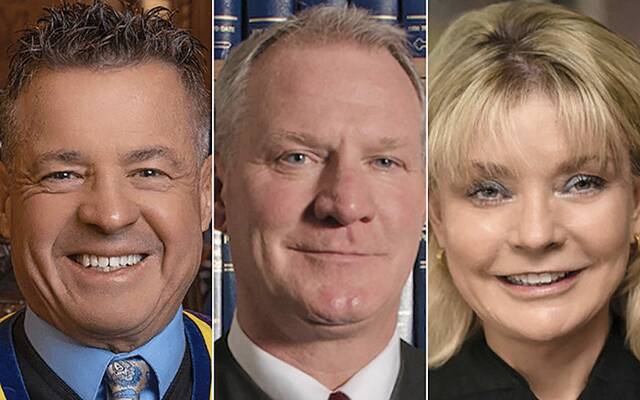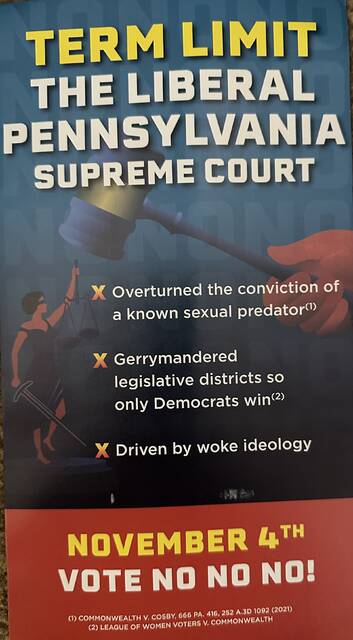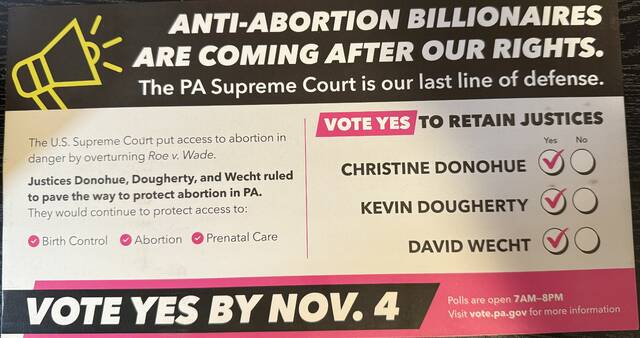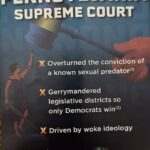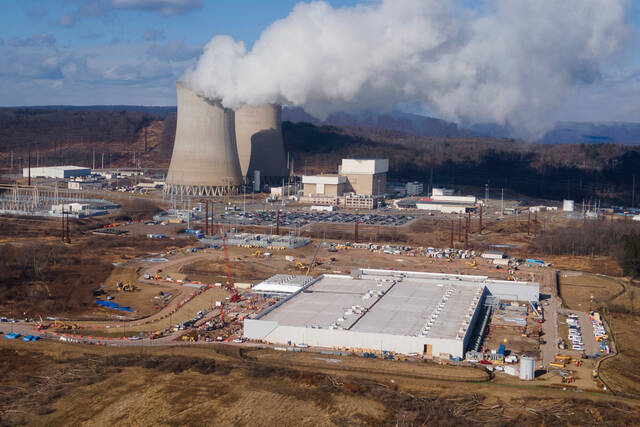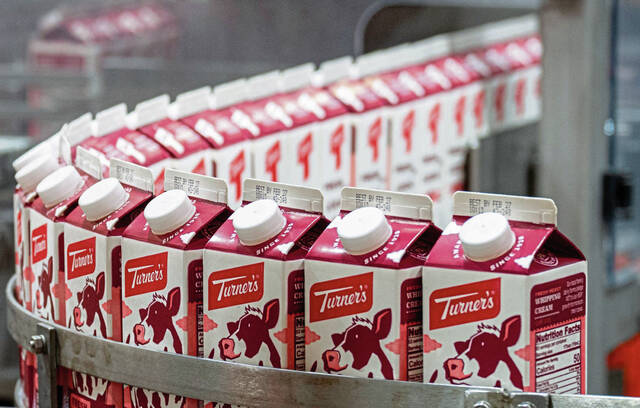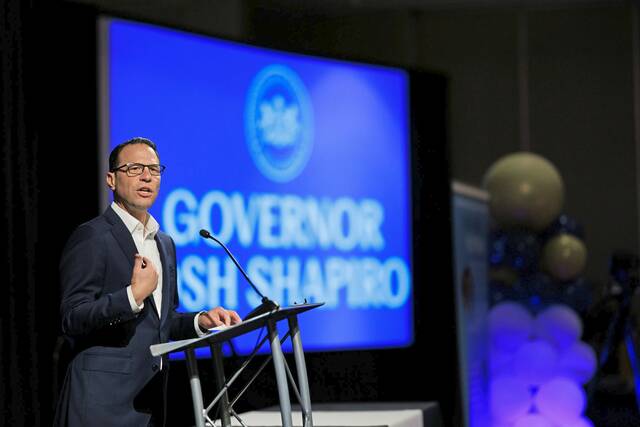Judicial retention races in Pennsylvania typically register barely a blip on the electoral radar.
Not this year.
With three Democratic state Supreme Court justices on November’s ballot, millions of dollars have poured in from both sides of the aisle in a furious battle for control that will have far-reaching consequences.
The GOP-leaning vote-no effort, underway for months, is urging voters to reject keeping the trio of justices for additional 10-year terms. It’s looking for a fresh start and to rebalance a court that now has a 5-2 Democratic majority.
“We want our justices to follow the rule of law and not legislate from the bench,” said James Markley, communications director for the Pennsylvania Republican Party. “I think people around Pennsylvania want to see new blood.”
But the Democratic-aligned group pushing for yes votes is working to spread its warning that if the justices — Christine Donohue and David Wecht, both of Allegheny County, and Kevin Dougherty of Philadelphia — aren’t retained, the judiciary will descend into chaos.
“You’d have a permanent politicization of the court,” said Eugene DePasquale, the new chair of the Pennsylvania Democratic Party. “A no vote would mean the Pennsylvania Supreme Court, for at least two years, would cease to function.
“That’s not defending democracy. That’s imperiling it.”
Why this race matters
Douglas Keith, founding editor of State Court Report and deputy director of the Judiciary Program at the Brennan Center for Justice at New York University, has been following the retention race closely.
“This is a court that is going to be deciding cases about election rules leading up to the midterms and the next presidential race,” Keith said. “That’s why this race is getting the attention that it is.”
When Donohue, Dougherty and Wecht were first elected in 2015, Keith said, it was a record-setting race in terms of money spent — $16.5 million, according to the Brennan Center. That trend is now continuing into retention.
“Retention elections have, generally, taken place quietly and without much fanfare even as competitive, general judicial races have become more politicized,” he said.
In the past, a jurist might have been targeted by a concerted no-vote effort as retaliation for a specific decision, Keith said.
But having outside influence trying to change the ideological balance on the court, he continued, is relatively new.
Traditionally, those who donate to state Supreme Court candidates, Keith said, are in-state business interests and trial lawyers — groups who look at the court as being important to their economic bottom lines.
And while that certainly continues, Keith said, national political groups are looking at the courts as important players in the next federal election.
J.J. Abbott, who runs Commonwealth Communications, a progressive advocacy group in Pennsylvania, said Republicans are focusing on redistricting and elections while Democrats are focused on abortion rights, democracy, the environment and public education.
“This court has certainly showed how important our courts are on issues like these,” Abbott said. “There’s a lot at stake, and particularly with the way the U.S. Supreme Court is ruling, it just makes these state supreme courts more important, being the last line of defense.”
Filling vacancies
If the three justices are not retained, there would be three vacancies on the court. Under Pennsylvania law, those vacancies are to be filled by gubernatorial appointment — but only with two-thirds approval from the state Senate.
Given the current political makeup in Harrisburg, many experts don’t think it’s likely the parties would agree to appoint anyone. Gov. Josh Shapiro is a Democrat; Republicans control the Senate.
But Christopher Nicholas, a Republican political consultant based in Harrisburg, disagrees.
“It is the oldest appellate court in the nation,” he said. “Somehow, I think it will survive no matter what the voters decide.
“Judicial vacancies get filled all the time no matter who the governor is and who the Senate is.”
It just might require more negotiations, Nicholas said.
But in the meantime, if there are three vacancies on the court, that would leave only four sitting justices — and a 2-2 split along party lines.
“That could put the court in a really ineffective position,” Abbott said. “It creates uncertainty, which could lead to chaos.”
Under a court with just four justices, any opinion that is not unanimous would not be precedential, meaning it would not serve as guidance for deciding similar cases. A 3-1 decision would overturn a lower court ruling on a specific case, while a 2-2 deadlock would mean a lower court decision must stand.
“It would be disastrous for the commonwealth,” said Shanin Specter, a Philadelphia attorney who has been working on the vote-yes effort.
Voting No
Nicholas said this year’s retention race is the first time in Pennsylvania’s modern era to feature a concerted and organized vote-no effort.
Only once in state history has a sitting justice not been retained. In 2005, Russell Nigro, who ran as a Democrat 10 years earlier, was the victim of a disgruntled populace angry over the legislature’s — and judiciary’s — middle-of-the-night pay raise that summer.
But this effort, Nicholas said is different.
“Never has more attention or money been paid to retention races in the commonwealth,” he said.
He attributed the change to the rise in popularity of President Donald Trump, as well as the increase in the number of registered Republican voters in Pennsylvania.
Ten years ago, Nicholas said, Democrats had a registration edge of 1 million.
“Now, it’s essentially even,” he said.
According to the Pennsylvania Department of State, there are 3.8 million registered Democrats and 3.6 million registered Republicans. More than 1.4 million voters list themselves as no affiliation or other.
“That’s a huge change,” Nicholas said.
Another difference, he continued, is in how the parties are approaching things this year versus in 2015 when the three justices initially ran.
Back then, Nicholas said, the Democrats and their allies did a better job of organizing than the Republicans did. But since then, he said, Republicans have upped their game.
Markley, with the Republican Party of Pennsylvania, said he thinks their effort has a good chance of knocking out two of the justices during the retention vote, setting the GOP up to potentially seize control of the court in 2027.
All three were targeted in the anti-retention effort because of what he called “absurd rulings” — the same decisions the justices cite with pride in explaining how they have upheld and defended the state constitution.
Citing as an example polarized decisions in mail-in ballot cases — including allowing such ballots to be counted if received within three days after Election Day — Markley said the three justices have created “a record of partisanship.”
Markley said the state party has knocked on 50,000 doors since the summer as part of its anti-retention effort.
“We’ve done a good job of waking people up.”
‘Dirty tactics’
Those backing retention see the effort to unseat the three justices as an affront.
“It’s an absolute atrocious undertaking that’s purely and simply a naked power grab by the Republican state committee and a bunch of billionaires,” said Specter, a son of Arlen Specter, the former U.S. senator from Philadelphia who died in 2012. “It’s just one more norm in our society that is being shattered.”
According to the Brennan Center at New York University, the estimated total TV spending on the retention race is more than $8 million.
Specter said it’s hard to trace the money precisely, but he estimates billionaire Jeffrey Yass donated at least $1 million to the vote no effort.
Yass did not respond to a request for comment.
The vote-yes team has spent more money on traditional advertising on television and digital communications, Abbott said, while vote no has spent a lot on direct mail.
“They’re directly targeting Democratic-leaning voters with mailers and text messages to convince them — or some would say trick them — into voting no,” he said.
Specter agreed.
The mailers, he said, tell voters to “protect your rights, vote no against the Supreme Court justices.”
The literature also suggests a no vote will defend democracy and implement term limits.
“The vote-no campaign was very aggressive in getting repetitive, misleading mailers out to try to trick voters,” Specter said.
The messaging, Keith said, speaks to the country’s current political climate.
But Abbott said no-vote mailers might be having an unintended consequence — “getting Democratic voters fired up and more in tune with the election.
“Democrats are feeling activated.”
The state party is focused on controlling what it can — spreading the message of what’s at stake, DePasquale said.
“They’re going to try their tricks and their dirty tactics, but we’re going to get out our message,” he said.
A partisan question?
The justices and the people who support them for retention say this election should not be about partisanship or party affiliation.
“But the other side turned it into one,” DePasquale alleged.
“The parties in Pennsylvania for generations have tacitly agreed that once a justice is elected, they will not be opposed for retention by a party,” Specter said.
Markley would not speak to that claim but turned the comment around.
“For generations, judges have tacitly agreed to be impartial and non-partisan,” he said. “These three justices have unconstitutionally locked us down during covid, and have made blatantly partisan political decisions to accept mail-in ballots days after an election. If they wanted to be treated like judges with integrity, they shouldn’t have acted like Democratic politicians in long black robes for the past decade.”
Nicholas, the GOP consultant, thinks the retention votes — for the Supreme Court and one seat each on the Superior and Commonwealth appellate courts — will be all or nothing.
“I believe they’ll either all win or all lose,” Nicholas said.
Specter believes the votes will be close — within 5 points either way.
“These three could very easily be defeated,” he said.
What makes a race like this hard, Specter continued, is that the justices don’t really have an opponent.
“They are all running against a mythical new person.”
Nicholas noted that even if Donohue wins her retention vote, she still must step down in two years when she reaches the mandatory retirement age of 75.
“Even if she gets retained, her seat is open in 2027,” he said.
But if she and the others lose their seats, Specter fears the potential repercussions.
“For those who live or die in the justice system, it’s a truly existential moment,” he said. “If one political party and a bunch of rich people are successful, we’re looking at the politicization of our justice system.”
But the Pennsylvania Republican Party’s Markley said the Dems are politicizing the race, too.
“Interesting that they would say this race is non-political when they are parading around on TV ads with a sitting Democratic governor,” he said. “Stop the games. Voters deserve honesty. You can’t claim that the race shouldn’t be political when you’re literally using political figures to campaign for it.
“The people of Pennsylvania are smarter than that.”
Coming Monday: TribLive profiles the state Supreme Court candidates running for retention.


